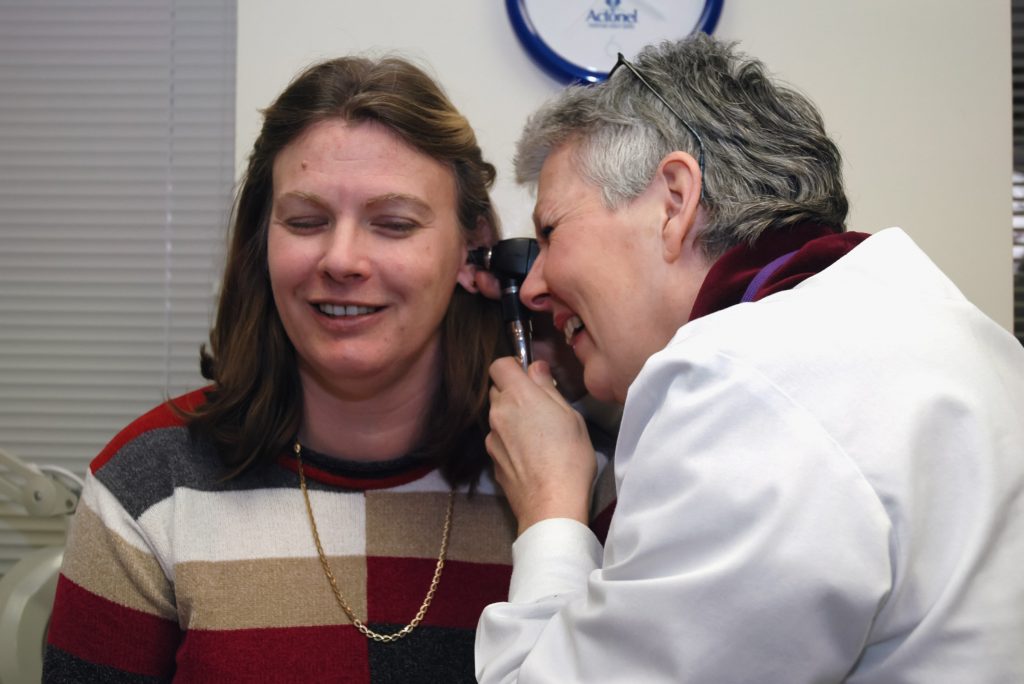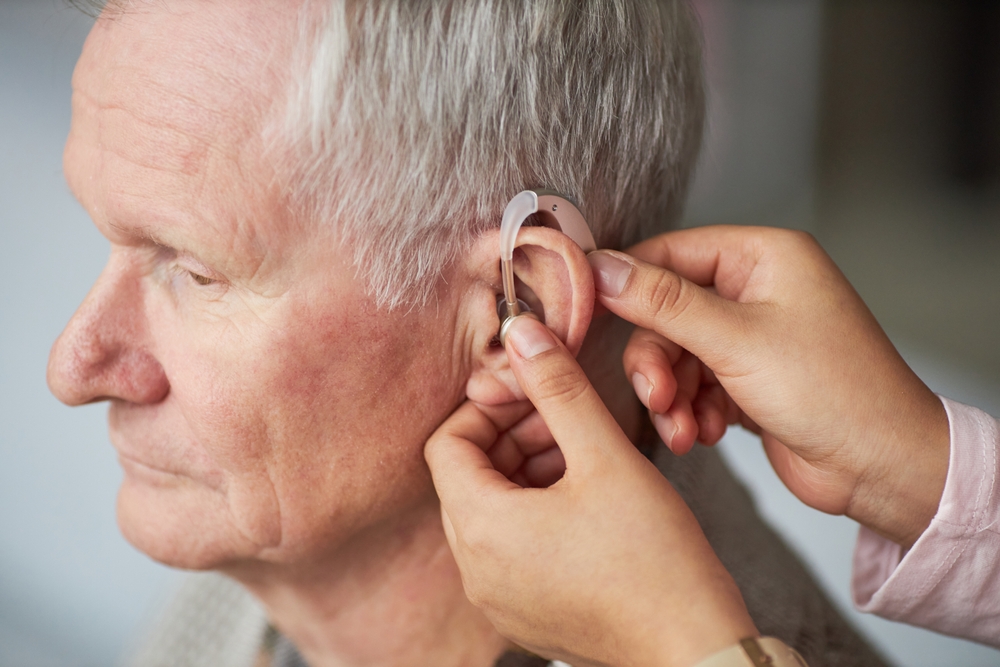Have you thought of possibly having mild hearing loss?
Do you sometimes catch yourself turning the TV volume up louder and louder? Do you strain to listen to someone speaking whilst in a noisy setting? These can be symptoms of mild hearing loss. As this impediment can happen to anyone, it is important to recognize the signs and seek help.
There are various causes of hearing loss. For instance, genetic factors are the predominant cause of hearing loss in more than half of pediatric cases.
Hearing loss, even mild, can cause concern or grievances, but fortunately, there are approaches to address it. Understanding the characteristics of mild hearing loss can assist in identifying the condition and prompting medical attention for oneself or others.
This article will provide an overview of mild hearing loss, including its causes, symptoms, severity levels, and available treatments.
Contents
- What is Mild Hearing Loss?
- What are the Causes of Hearing Loss?
- What are the Symptoms of Hearing Loss?
- How Severe is Hearing Loss?
- When Should Help Be Sought?
- What Treatments Are Available for Hearing Loss?
- Conclusion
What is Mild Hearing Loss?
Mild hearing loss is an impairment in the ability to hear sounds at a lower volume than is considered normal.
Decibels (dB) are the unit used to measure sound pressure level or volume. Sound with a higher decibel rating is louder than sound with a lower rating. The human auditory range spans from 0 dB, representing complete silence, to approximately 140 dB, which is considered intensely loud.
Therefore, mild hearing loss is when one is unable to hear sounds quieter than 25 decibels (dB) for adults and 15 dB for children; however, more sensitive ears might be affected by noises even softer still.

How do doctors classify hearing loss?
There are four classifications: conductive, sensorineural, mixed, and central.
- Conductive hearing loss is the most common type of hearing loss, which occurs due to an issue with the formation or structure of the outer or middle ear that causes sound to be unable to travel through properly.
- Sensorineural hearing loss is caused by inner ear damage. Consequentially, soft sounds are difficult to hear, while loud sounds come off as muffled.
- Mixed hearing loss is a combination of conductive and sensorineural, whereby damage has occurred in the outer, middle, and inner ear.
- Central hearing loss is a diminished ability to detect and understand sound, whereby signal pathways between the ear and the brain are impaired.
What does mild hearing loss sound like?
The kinds of sounds that may be missed could include whispers, birds chirping, rustling leaves, tapping feet, and running water.
This level of hearing loss can have a noticeable impact on communication. Those with this condition often report having difficulty understanding conversations in noisy environments or when the person they are talking to is facing away from them or standing at a distance.
What are the Causes of Hearing Loss?
The ear can be divided into three parts:
- The outer ear.
- The auditory canal (middle ear).
- The cochlea (inner ear).
Each part has its own role in enabling us to hear sounds. Therefore, when this capability is reduced, it is likely because of damage to one or more of these parts.
An infection or blockage of objects like a buildup of cerumen (ear wax) and overexposure to loud noises may affect the outer or middle part of the ear.
On the other hand, an issue with the inner ear can arise from an inherited genetic condition or certain medications, aging, or physical trauma. For instance, individuals over the age of 65 commonly experience hearing loss. This is because, as we age, the tiny hairs and nerve cells in our inner ear slowly break down.
Other factors, such as extended exposure to loud noise and medical conditions like otosclerosis, can result in partial or complete hearing loss.
What are the Symptoms of Hearing Loss?
Difficulty hearing and frequently asking others to repeat themselves during conversations are common indicators that one may have a hearing problem.
Other signs can include:
- Difficulty locating where noises are coming from.
- Not being able to hear certain high-pitched sounds.
- Hearing sounds muffled.
- Thinking people are mumbling or whispering, not talking at a normal volume.
- Facing the source of the noise helps you hear better.
- Listening to audio at a high volume but does not sound loud to you.
How Severe is Hearing Loss?
Hearing loss can be divided into four general categories, whereby each represents a degree of severity of the loss that you might be experiencing.
- Mild hearing loss indicates difficulty comprehending high-pitched noises or words that are spoken softly.
- Moderate hearing loss can affect speech comprehension when conversing in the midst of a loud environment.
- Severe hearing loss may cause you to miss out on most everyday conversations.
- Profound hearing loss leaves people severely deaf.
Can a person with moderate hearing loss hear speech?
Moderate hearing loss means that not only consonant sounds are more difficult to distinguish, but so are vowel sounds.
The ability to understand conversations may be naturally hindered and people with moderate hearing loss often describe their experience as though they can still hear but aren’t always able to comprehend the conversation.
As a result, moderate hearing loss sufferers may find it difficult in social settings or situations, such as attending lectures or presentations in a workroom.
When Should Help Be Sought?
Do not hesitate to consult an audiologist and make arrangements for a professional assessment or complete an online hearing test. Doing so will allow you to receive proper confirmation of your symptoms and, thus, seek the proper treatment.
An audiologist can perform a hearing test to check for the type and severity of hearing loss you might have.
This hearing test measures the types of sounds you can hear and compares the configurations of high-pitched sounds versus low-pitched sounds to determine your overall auditory senses.
The audiogram will highlight any areas in which there are issues with sound reception. It is a painless, noninvasive, and quick way of pinpointing whether or not hearing impairments are present.
Alternatively, you can use an online tool, such as a hearing quiz provided by El Dorado Hearing, which provides a preliminary confirmation of your condition within 5 minutes at no cost.
What Treatments Are Available for Hearing Loss?
Hearing loss treatments range from simple and non-invasive to surgical and complicated. The type of treatment that will be performed will depend on the root problem or cause of the hearing loss.
One form of treatment is where the individual is prescribed antibiotics which can help clear up any underlying infection that may be causing hearing loss. These usually come in the form of ear drops.
If a medication is found to be responsible for your hearing loss, changing this medication can also be helpful.
In some cases, surgery may be necessary to reverse hearing loss caused by scar tissue, otosclerosis, or infection like Meniere’s disease.
However, immediate treatment is recommended for instances where the loss is sudden.
The degree of severity and type of hearing loss can also affect the type of treatment.
For example, if you have tinnitus as a side effect from being around loud noise, listening therapy or specialized sound wave masks may help reduce symptoms over time.
There are also hearing devices available that can partially restore or improve your hearing capabilities, such as hearing aids, assistive listening devices, and implants.
Hearing aids come in different styles, whereby some can be hooked over the ear or placed inside the ear canal. Unfortunately, despite technological advancements, hearing aids do not repair total hearing loss but merely help make sounds louder and clearer.
Unlike hearing aids which amplify sound, implants work by taking audio signals and converting them into electrical pulses that stimulate tiny electrodes implanted in your inner ear.
An outer device worn either on your head or behind your ear picks up sound from your surroundings and transmits it to a receiver under your skin. The receiver converts audio signals into electrical pulses that stimulate auditory nerve fibers within the inner ear allowing you to hear sounds without using a conventional hearing aid.
Implant surgeries can cost between $30-60K depending on the degree of complexity involved, but the success rate of these operations is typically high, with more than 80 percent of people resuming normal hearing levels postoperative.
Conclusion
To sum up, mild hearing loss is a hearing impairment that makes it difficult to follow a normal conversation and hear soft noises. There are a range of causes, but all would affect a part of the ear that is essential to hearing. Several symptoms include struggling to hear what the other person is saying and often having to ask people to repeat themselves during a conversation.
Treatment should be sought as soon as there are symptoms, which can be confirmed by an audiologist or by taking an online quiz. Once the hearing loss and level of severity have been identified, the proper treatment can be prescribed, ranging anywhere from receiving antibiotics to using hearing aids.
We hope the information provided in this article has been helpful. Looking for more insightful articles like this? Then visit our website to learn more about hearing.




Leave a Reply